Choosing a State - Most Important Factors
Page 1 of 1
 Choosing a State - Most Important Factors
Choosing a State - Most Important Factors
There are many opinions and maps on this forum. For me it is Health, Food Availability, Freedom and Lack of Government Control.
Healthcare
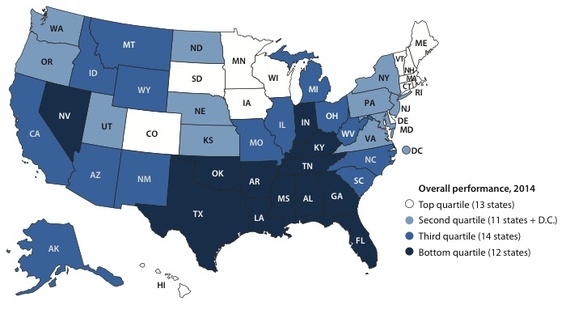
Unemployment interactive map 1979-2014
Link: https://i.imgur.com/XiRz3Mc.gif
Unemployment Map 1/14

Unemployment rate July 2014 (Map Unavailable)
Local Food Insecurity
The darker the less food security, the lighter the more security of obtaining local food you have

Lacked money for food

Water Supply sustainability in the future - you don't want to live in the brown areas
Current drought map: http://droughtmonitor.unl.edu/

Water stress map - taxing the fresh water supply. Brown areas more stress on water supplies, blue less. Hint we need water to survive.
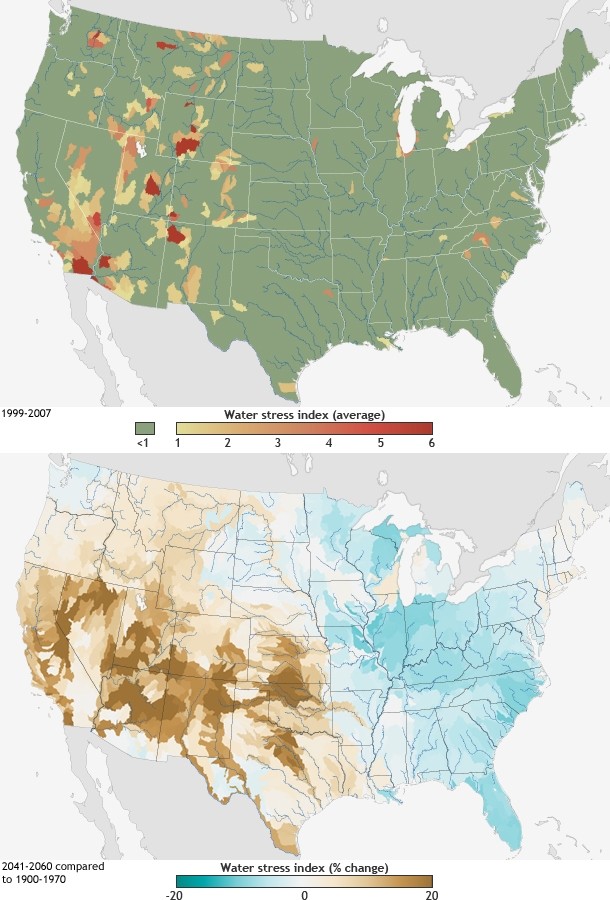
A warming world means more evaporation that translates into heavier precipitation events. Flooding monsoon type rains and mega blizzards that dump feet of snow are more likely in areas marked in blue. http://www.climate.gov/news-features/featured-images/heavy-downpours-more-intense-frequent-warmer-world

Growing season - Frost free days. You want to live in the pinker areas so you have longer seasons to grow vegetables. Just avoid the drought areas as indicated on the map above.

Climate change temperature maps. You want to avoid orange and deep orange areas regardless of what scenario unfolds. Heatwaves are deadly and bad for crops>
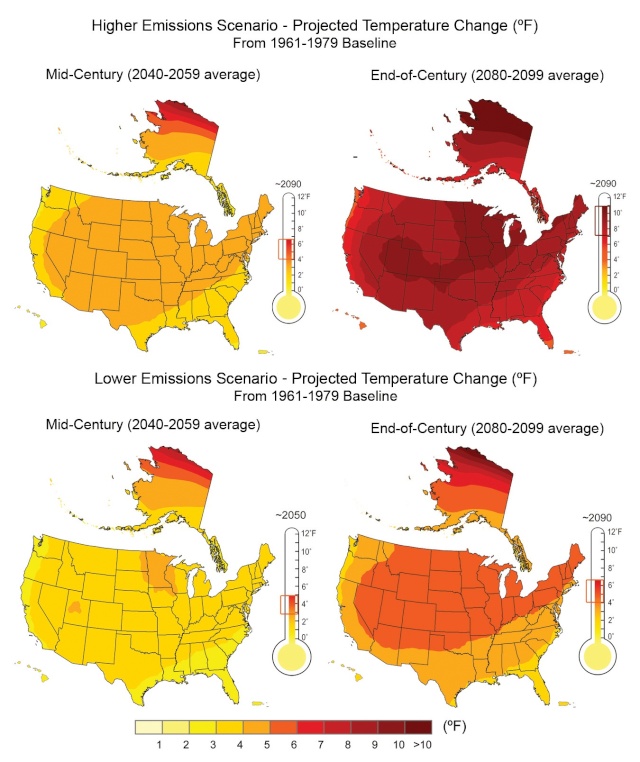
Projected changes affecting agricultural productivity (heat and drought affecting food crops)

Pick your climate
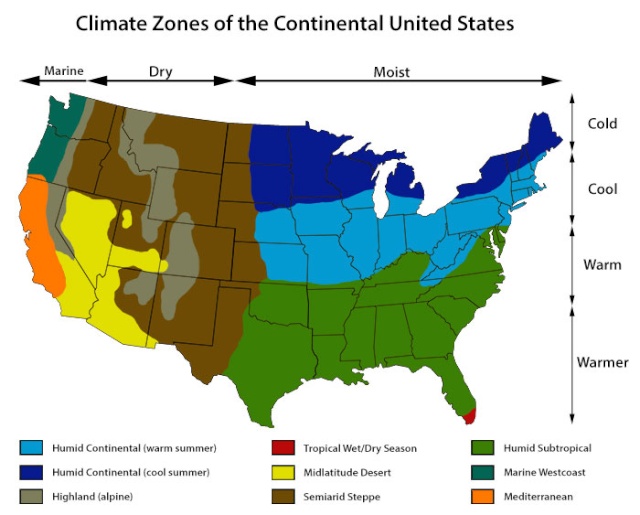
Disaster Map USA - Avoiding life threatening emergencies

Freedom in the 50 States

Incarceration Rate - where you are most likely to wind up in prison

Peace index - Where crime is highest and lowest (Hint: Stay out of the darker purple states)

Most of all unless you already have the 6 figure income stay away from the high cost of living states
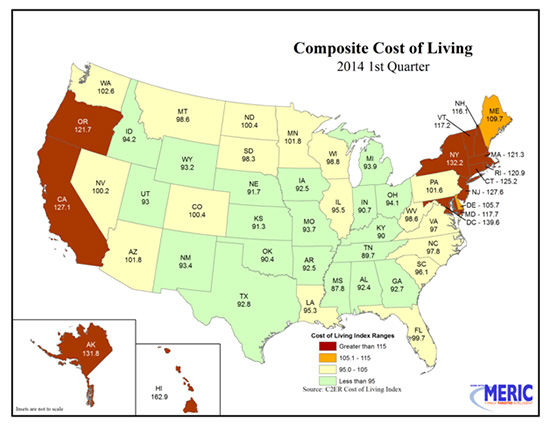
Stay away from highly urbanized states

Stress - Most stressed states in America
This includes data from the US Census's American Community Survey on 6 indicators: hours worked, population density, unemployment rate, commute length, how much income is spent on housing, and how many people lack health insurance.

Where people are moving

In 1865, Horace Greeley said "go west, young man," and, for a century and a half, men and women, young and old, were keen to listen. Even into the early 2000s, the sunbelt stretching into the suburban southwest fattened with new housing developments—ultimately, to disastrous effect. But in the last decade, the ambition to go west has been replaced with a lazier notion—to "stay put."
"Americans are moving far less often than in the past, and when they do migrate it is typically no longer from places with low wages to places with higher wages," Tim Noah wrote in Washington Monthly. "Rather, it’s the reverse." Why America lost her wanderlust is not entirely clear—perhaps dual-earner households make long moves less likely; perhaps the Great Recession pinned underwater homeowners on their plots—but those still wandering aren't going to the right cities.
When Greeley suggested a westward move, he wasn't making an argument for sun and gold. He was, above all, suggesting that young people escape from areas with expensive housing:

Americans aren't simply moving to the states with the lowest unemployment (Oregon, Tennessee, and North Carolina all have jobless rates above the national average). More importantly, we aren't moving to states with the best records for low-income families getting ahead. In fact, we're often fleeing the best places for a upwardly mobile middle class.
According to Harvard’s Equality of Opportunity Project, the states with the most upwardly mobile cities include Pennsylvania (with five of the top 12 cities), New York and New Jersey (Albany, Newark, and New York are in the top 30). All three states are seeing net emigration, according to the Atlas map. Five of the 11 worst cities for poor children to move into the top quintile are in Tennessee and North Carolina—two of the few states to see more inbound moves in 2013.
This doesn't make much sense if you envision American families rushing to the most promising metros. It does make sense if you see American families rushing to the most affordable homes.
Some of America's most productive cities for medium- and low-income families—Boston, Honolulu, San Jose, New York—are also the most expensive. This is often due to (or at least, exacerbated by) exclusionary zoning and housing regulations that limit the number of available units, which drives up the price of housing, ensuring that low-income families can't afford to live there. The sad irony is that density is a good predictor of upward mobility, but sunbelt cities with affordable housing often sprawl deep into the exurbs, where families aren't anywhere near the best jobs. The very thing that makes those cities attractive places to get to also makes them bad places to get ahead.
In the map above, every state had fewer inbound moves in 2013 than in 2004, except for two small states with relatively little traffic: Oklahoma and North Dakota. But the problem isn't just that Americans aren't moving as much as they used to. It's that the allure of cheaper housing—famously celebrated by Horace Greeley, himself!—often leads families to cities with the worst social mobility. The instinct to "go west" might doom families to go nowhere, at all.
Finally, Gun Control. It does not matter if you are in a state with strong gun laws or weak ones. Criminals are out of control and heavily armed. With the Supreme Court decision that the police have no duty to protect the individual you are on your own. So the states in RED with less gun restrictions on law abiding citizens are SAFER, but only for those who own and carry guns for personal protection.

Healthcare

Unemployment interactive map 1979-2014
Link: https://i.imgur.com/XiRz3Mc.gif
Unemployment Map 1/14

Unemployment rate July 2014 (Map Unavailable)
| State | Rate | State | Rate |
| Alabama | 7.0 | Montana | 4.6 |
| Alaska | 6.5 | Nebraska | 3.6 |
| Arizona | 7.0 | Nevada | 7.7 |
| Arkansas | 6.2 | New Hampshire | 4.4 |
| California | 7.4 | New Jersey | 6.5 |
| Colorado | 5.3 | New Mexico | 6.6 |
| Connecticut | 6.6 | New York | 6.6 |
| Delaware | 6.2 | North Carolina | 6.5 |
| D.C. | 7.4 | North Dakota | 2.8 |
| Florida | 6.2 | Ohio | 5.7 |
| Georgia | 7.8 | Oklahoma | 4.6 |
| Hawaii | 4.4 | Oregon | 6.9 |
| Idaho | 4.8 | Pennsylvania | 5.7 |
| Illinois | 6.8 | Puerto Rico | 13.1 |
| Indiana | 5.9 | Rhode Island | 7.7 |
| Iowa | 4.5 | South Carolina | 5.7 |
| Kansas | 4.9 | South Dakota | 3.7 |
| Kentucky | 7.4 | Tennessee | 7.1 |
| Louisiana | 5.4 | Texas | 5.1 |
| Maine | 5.5 | Utah | 3.6 |
| Maryland | 6.1 | Vermont | 3.7 |
| Massachusetts | 5.6 | Virginia | 5.4 |
| Michigan | 7.7 | Washington | 5.6 |
| Minnesota | 4.5 | West Virginia | 6.3 |
| Mississippi | 8.0 | Wisconsin | 5.8 |
| Missouri | 6.5 | Wyoming | 4.4 |
Local Food Insecurity
The darker the less food security, the lighter the more security of obtaining local food you have

Lacked money for food

Water Supply sustainability in the future - you don't want to live in the brown areas
Current drought map: http://droughtmonitor.unl.edu/

Water stress map - taxing the fresh water supply. Brown areas more stress on water supplies, blue less. Hint we need water to survive.

A warming world means more evaporation that translates into heavier precipitation events. Flooding monsoon type rains and mega blizzards that dump feet of snow are more likely in areas marked in blue. http://www.climate.gov/news-features/featured-images/heavy-downpours-more-intense-frequent-warmer-world

Growing season - Frost free days. You want to live in the pinker areas so you have longer seasons to grow vegetables. Just avoid the drought areas as indicated on the map above.

Climate change temperature maps. You want to avoid orange and deep orange areas regardless of what scenario unfolds. Heatwaves are deadly and bad for crops>

Projected changes affecting agricultural productivity (heat and drought affecting food crops)

Pick your climate

Disaster Map USA - Avoiding life threatening emergencies

Freedom in the 50 States

Incarceration Rate - where you are most likely to wind up in prison

Peace index - Where crime is highest and lowest (Hint: Stay out of the darker purple states)

Most of all unless you already have the 6 figure income stay away from the high cost of living states

Stay away from highly urbanized states

Stress - Most stressed states in America
This includes data from the US Census's American Community Survey on 6 indicators: hours worked, population density, unemployment rate, commute length, how much income is spent on housing, and how many people lack health insurance.

Where people are moving

In 1865, Horace Greeley said "go west, young man," and, for a century and a half, men and women, young and old, were keen to listen. Even into the early 2000s, the sunbelt stretching into the suburban southwest fattened with new housing developments—ultimately, to disastrous effect. But in the last decade, the ambition to go west has been replaced with a lazier notion—to "stay put."
"Americans are moving far less often than in the past, and when they do migrate it is typically no longer from places with low wages to places with higher wages," Tim Noah wrote in Washington Monthly. "Rather, it’s the reverse." Why America lost her wanderlust is not entirely clear—perhaps dual-earner households make long moves less likely; perhaps the Great Recession pinned underwater homeowners on their plots—but those still wandering aren't going to the right cities.
When Greeley suggested a westward move, he wasn't making an argument for sun and gold. He was, above all, suggesting that young people escape from areas with expensive housing:
Well ... plus ca change. Today, the aversion to high rental costs is perhaps the most important driver of national migration. According to Atlas Van Lines' annual survey of household moves, many dense, high-income states are bleeding people, while many poorer states with plentiful land continue to add families. Here is 2013's map, with ORANGE states losing more people and BLUE states gaining...Washington is not a place to live in. The rents are high, the food is bad, the dust is disgusting, and the morals are deplorable. Go West, young man, go West and grow up with the country.

Americans aren't simply moving to the states with the lowest unemployment (Oregon, Tennessee, and North Carolina all have jobless rates above the national average). More importantly, we aren't moving to states with the best records for low-income families getting ahead. In fact, we're often fleeing the best places for a upwardly mobile middle class.
According to Harvard’s Equality of Opportunity Project, the states with the most upwardly mobile cities include Pennsylvania (with five of the top 12 cities), New York and New Jersey (Albany, Newark, and New York are in the top 30). All three states are seeing net emigration, according to the Atlas map. Five of the 11 worst cities for poor children to move into the top quintile are in Tennessee and North Carolina—two of the few states to see more inbound moves in 2013.
This doesn't make much sense if you envision American families rushing to the most promising metros. It does make sense if you see American families rushing to the most affordable homes.
Some of America's most productive cities for medium- and low-income families—Boston, Honolulu, San Jose, New York—are also the most expensive. This is often due to (or at least, exacerbated by) exclusionary zoning and housing regulations that limit the number of available units, which drives up the price of housing, ensuring that low-income families can't afford to live there. The sad irony is that density is a good predictor of upward mobility, but sunbelt cities with affordable housing often sprawl deep into the exurbs, where families aren't anywhere near the best jobs. The very thing that makes those cities attractive places to get to also makes them bad places to get ahead.
In the map above, every state had fewer inbound moves in 2013 than in 2004, except for two small states with relatively little traffic: Oklahoma and North Dakota. But the problem isn't just that Americans aren't moving as much as they used to. It's that the allure of cheaper housing—famously celebrated by Horace Greeley, himself!—often leads families to cities with the worst social mobility. The instinct to "go west" might doom families to go nowhere, at all.
Finally, Gun Control. It does not matter if you are in a state with strong gun laws or weak ones. Criminals are out of control and heavily armed. With the Supreme Court decision that the police have no duty to protect the individual you are on your own. So the states in RED with less gun restrictions on law abiding citizens are SAFER, but only for those who own and carry guns for personal protection.


Consumer Alert- Posts : 28
Join date : 2013-04-22
 Similar topics
Similar topics» Choosing A Good State To Live MAPS
» The Only Factor To Consider When Choosing a State - Making Money
» State by State Law on Arrests For Minor Traffic Violations
» State By State Police Misconduct
» Food availability is most important
» The Only Factor To Consider When Choosing a State - Making Money
» State by State Law on Arrests For Minor Traffic Violations
» State By State Police Misconduct
» Food availability is most important
Page 1 of 1
Permissions in this forum:
You cannot reply to topics in this forum|
|
|

